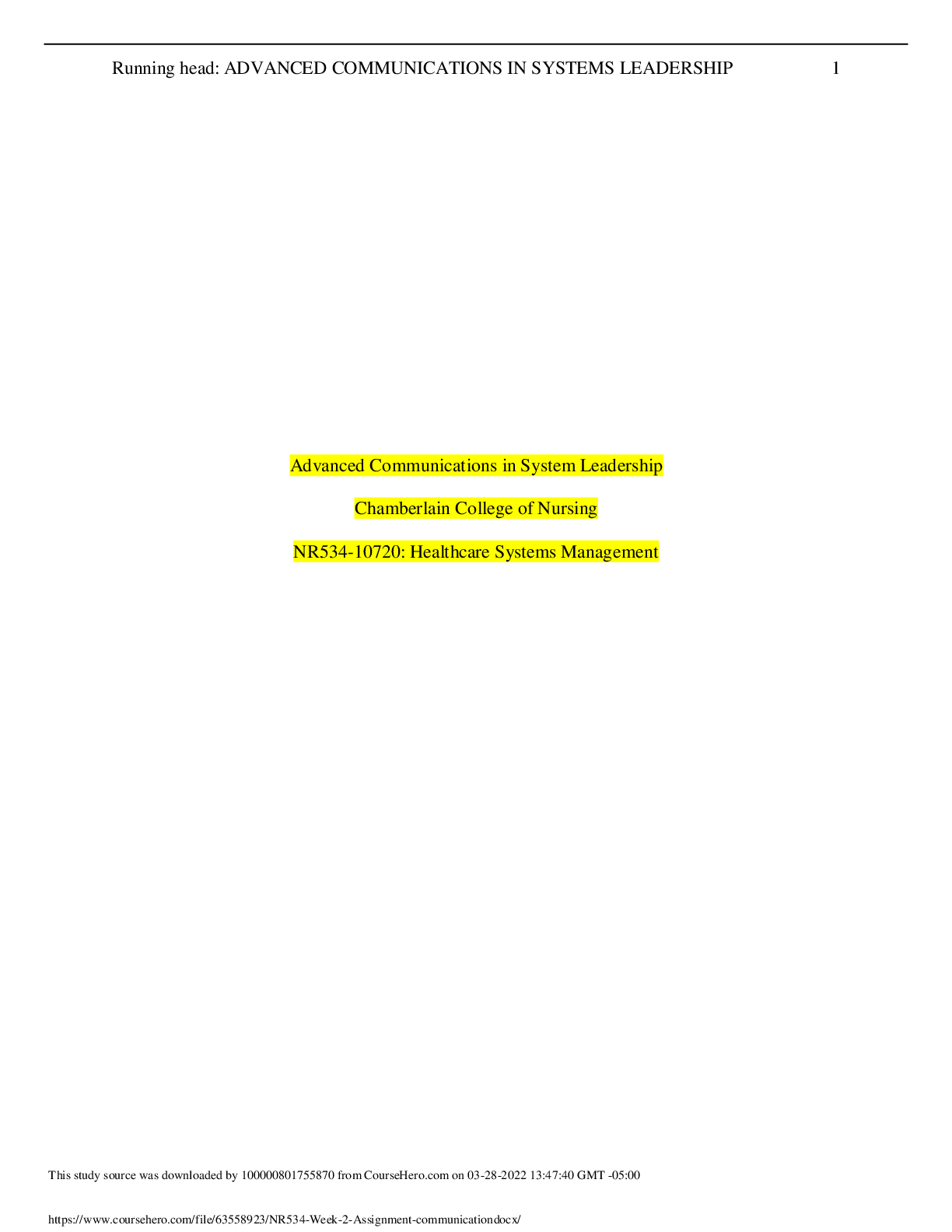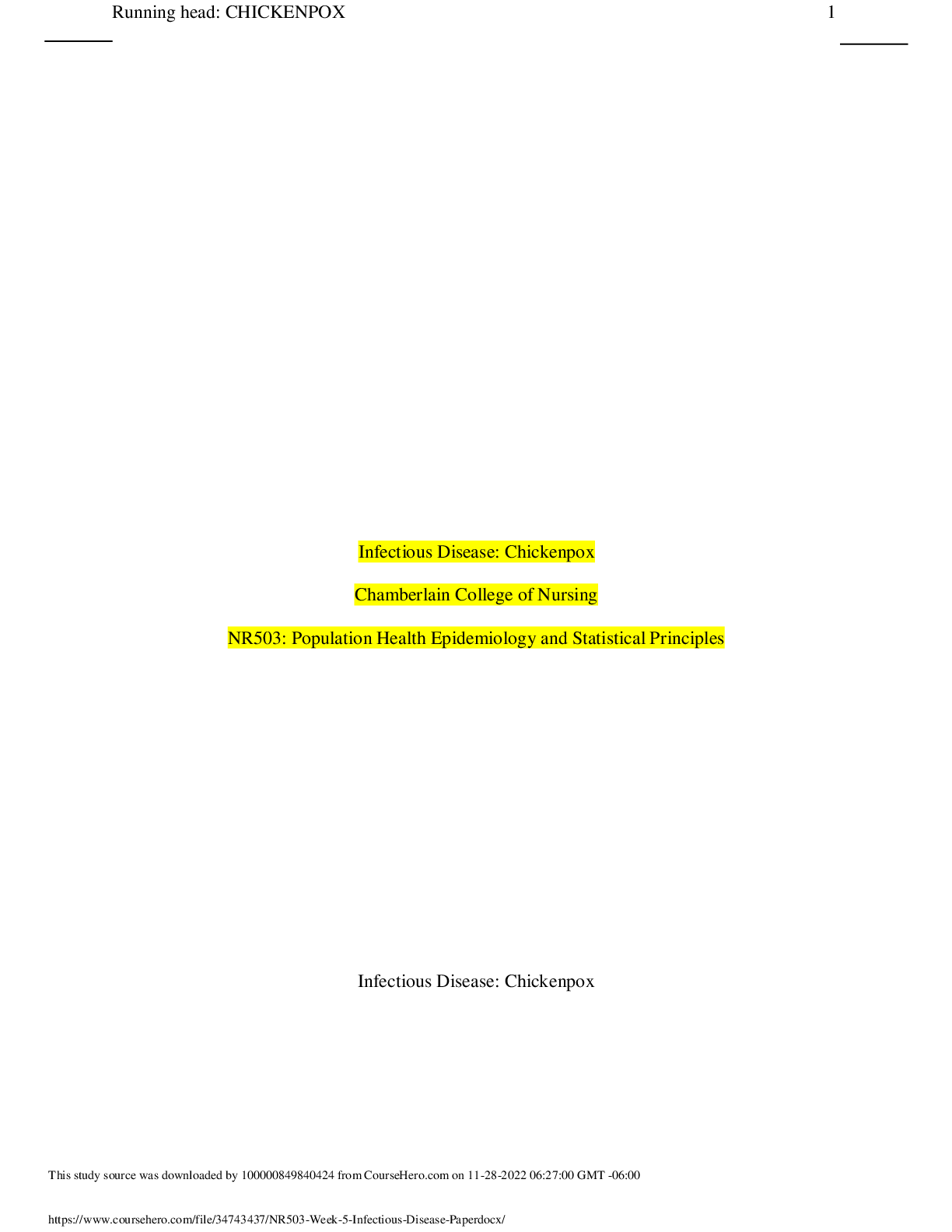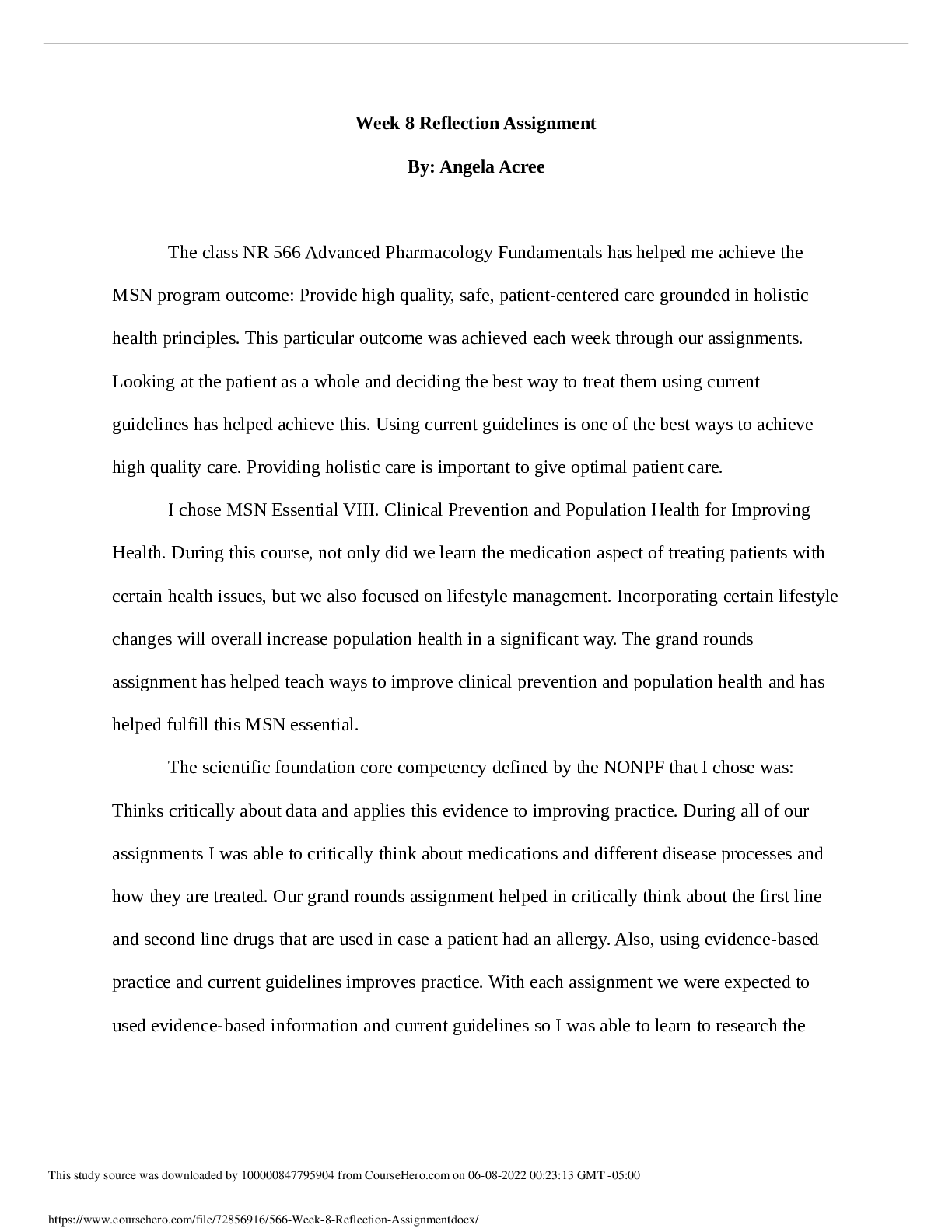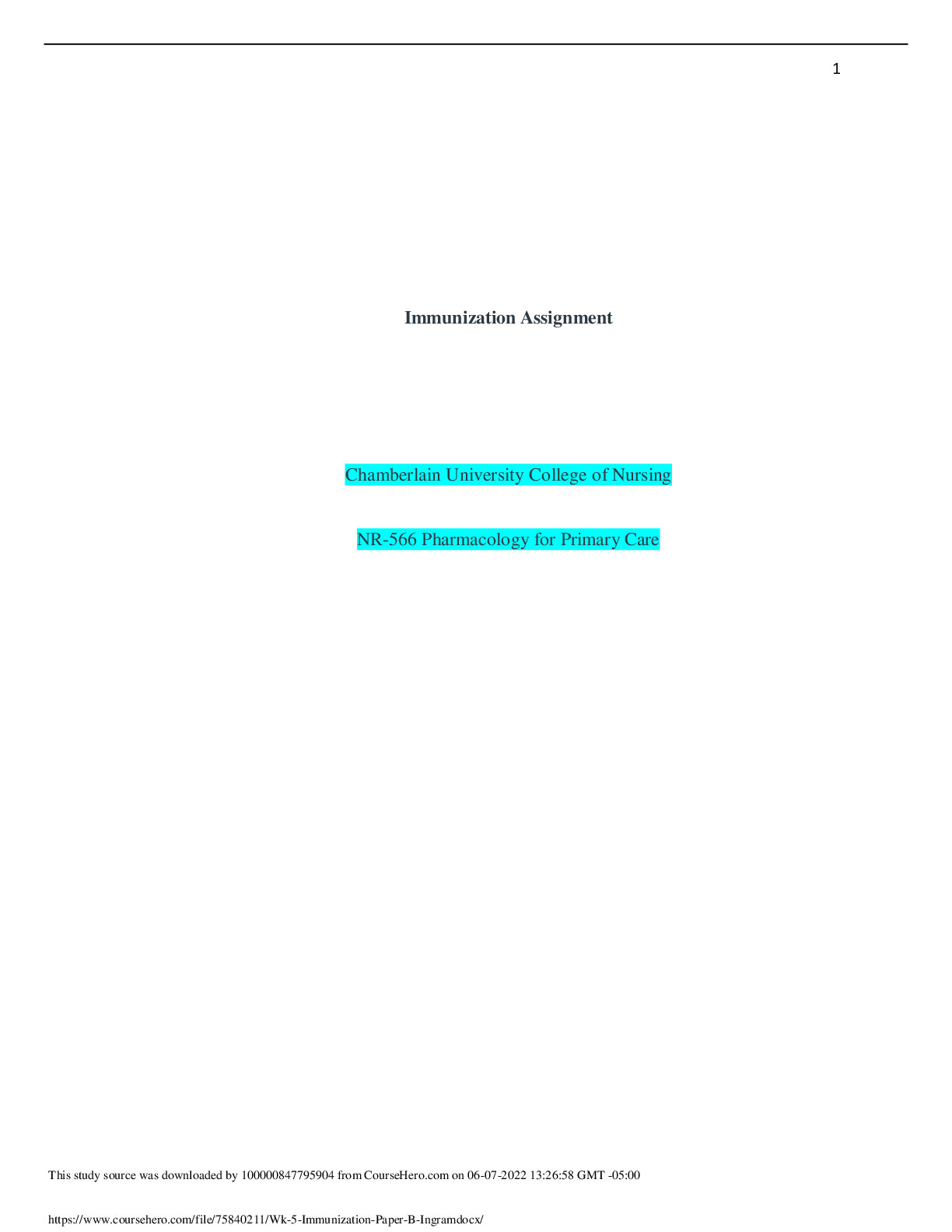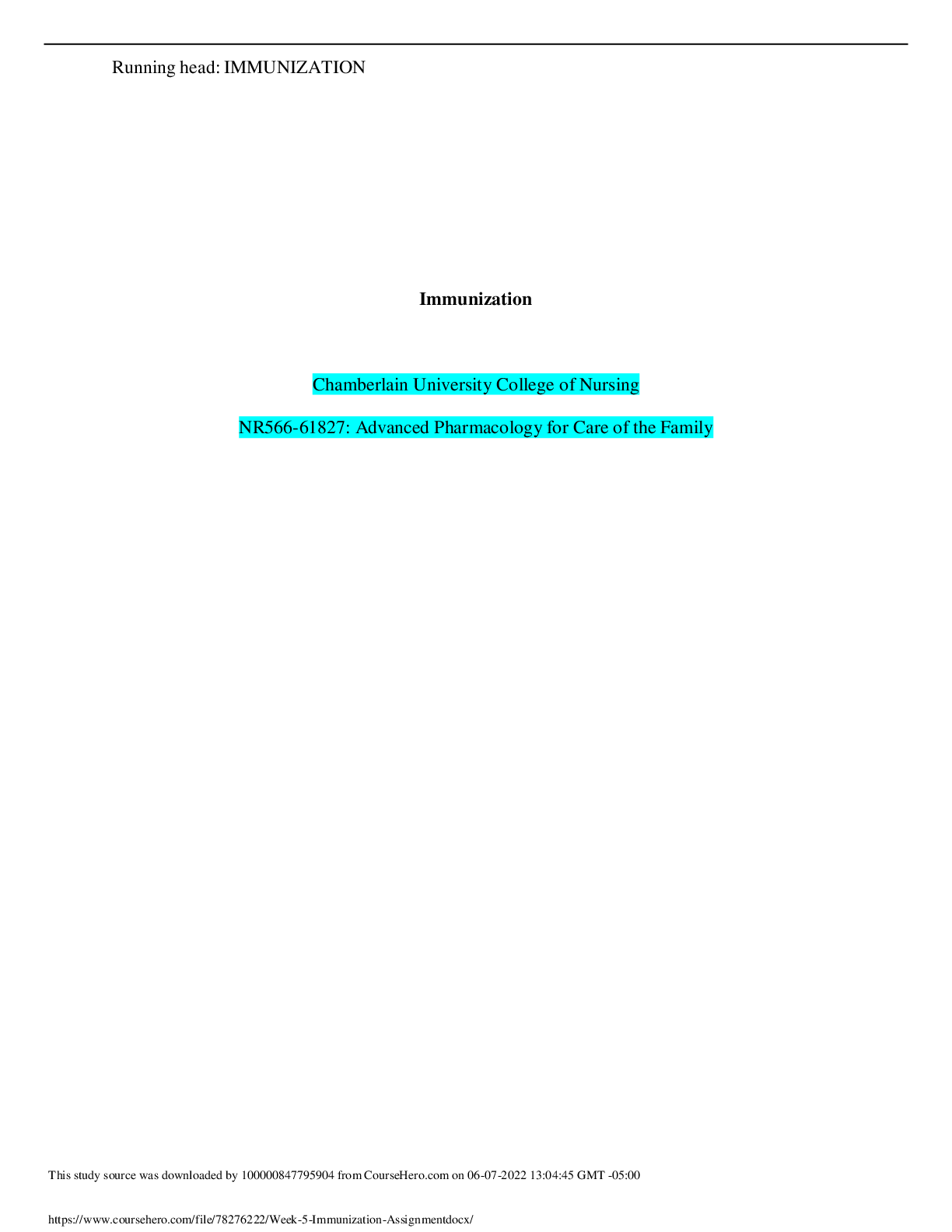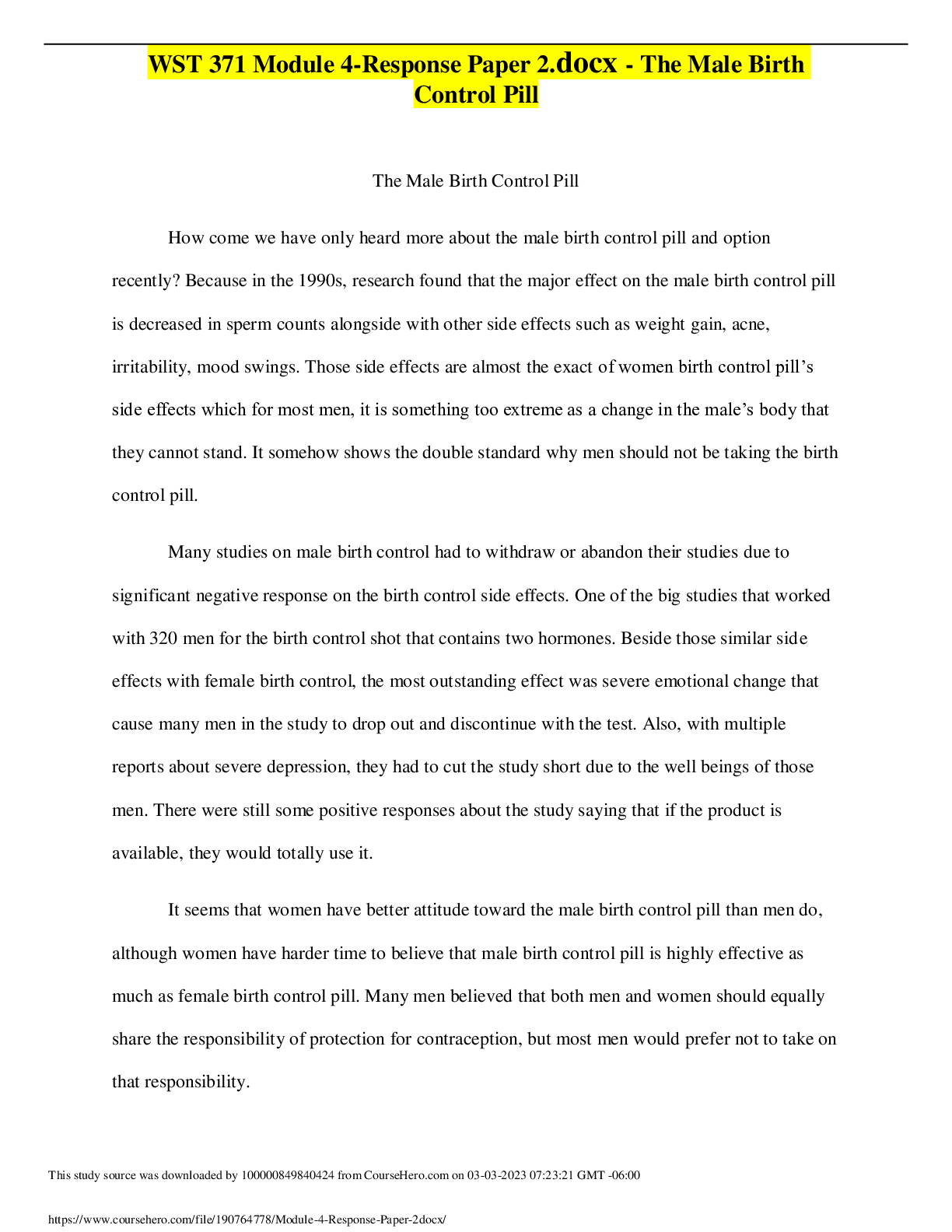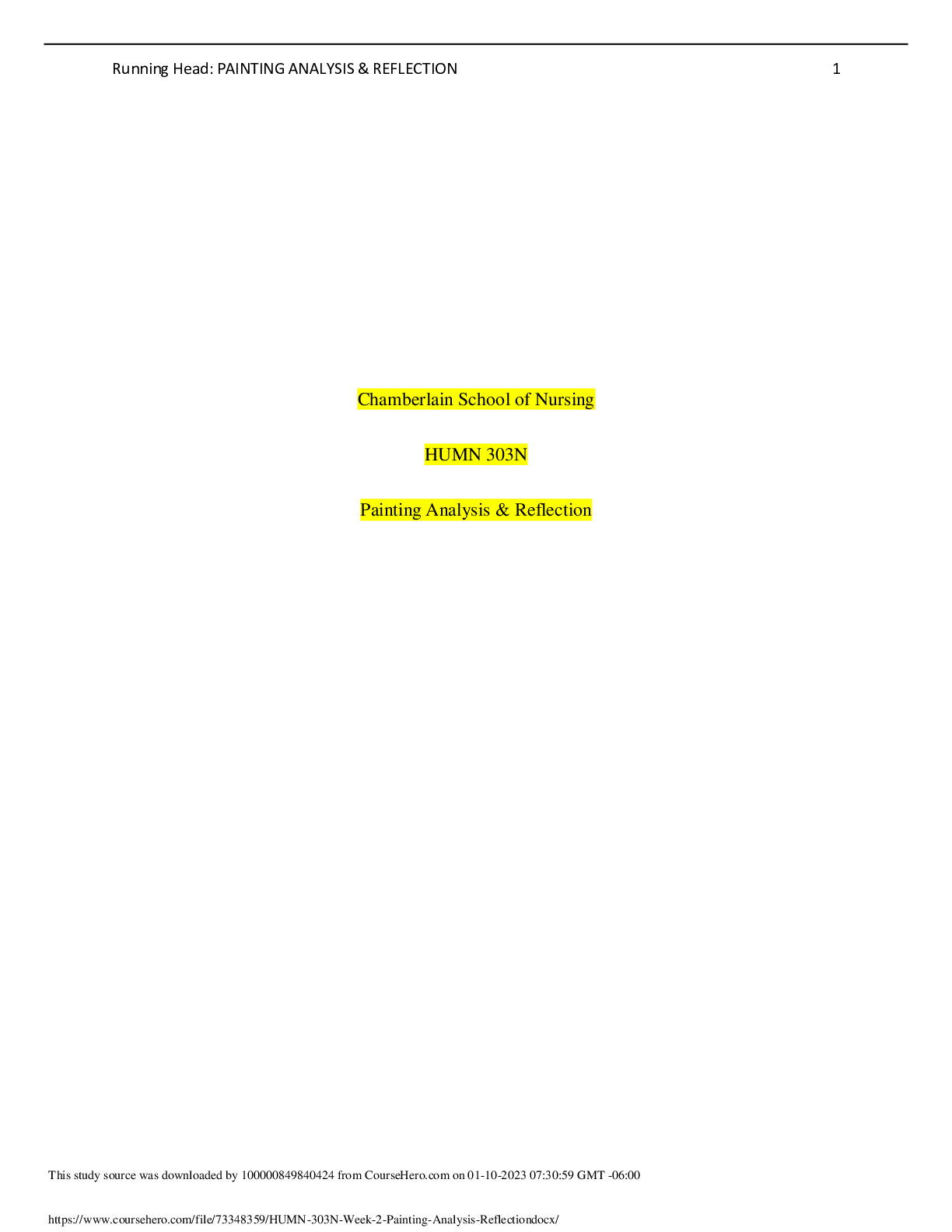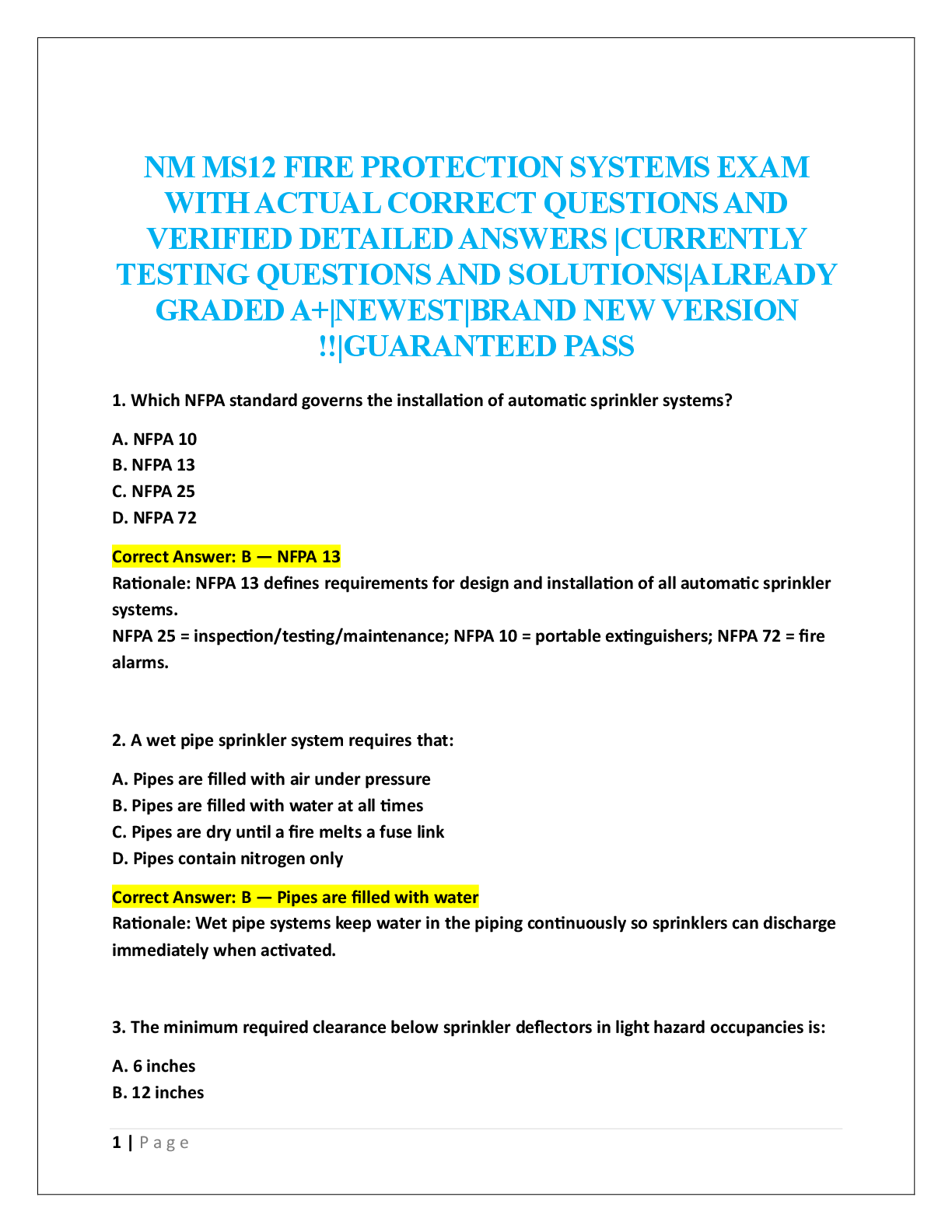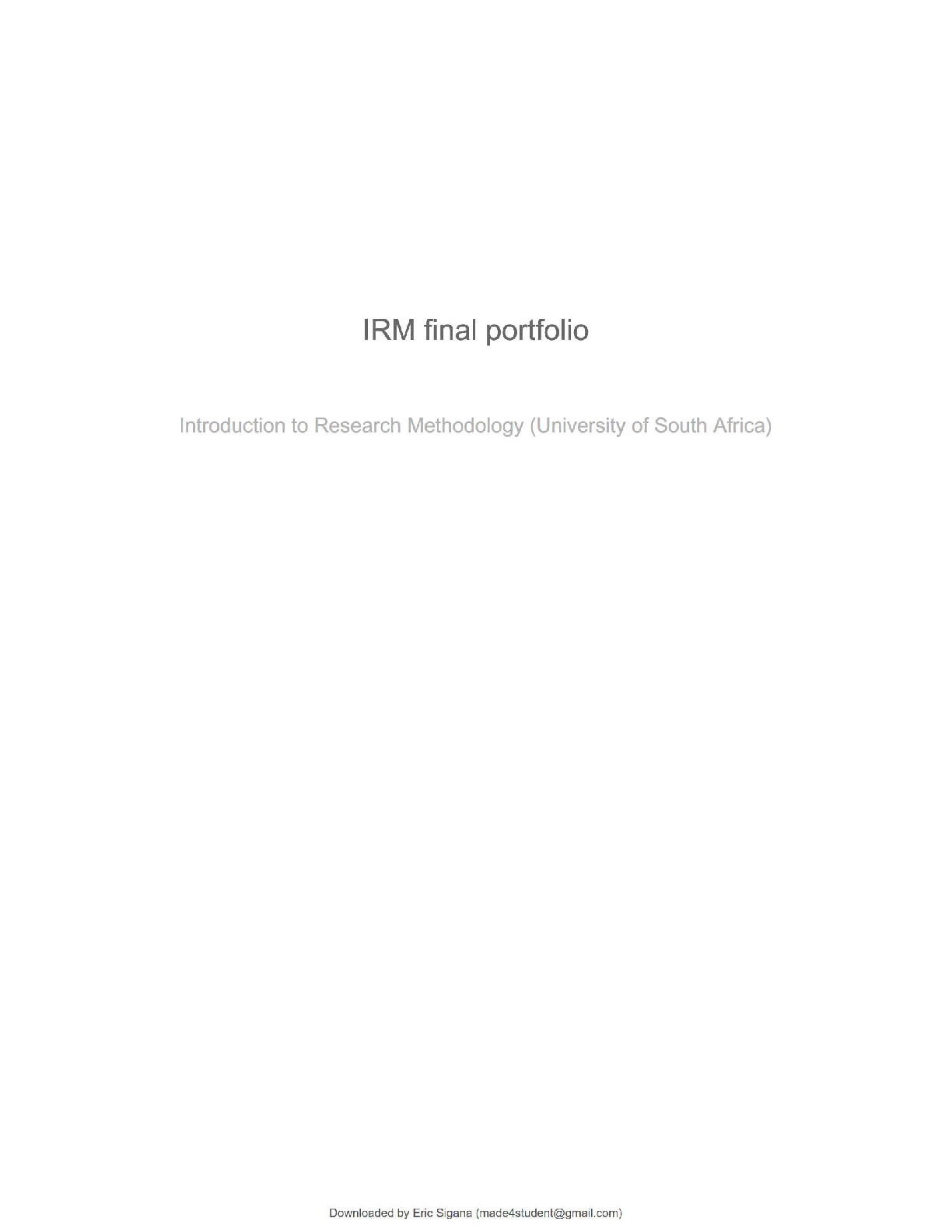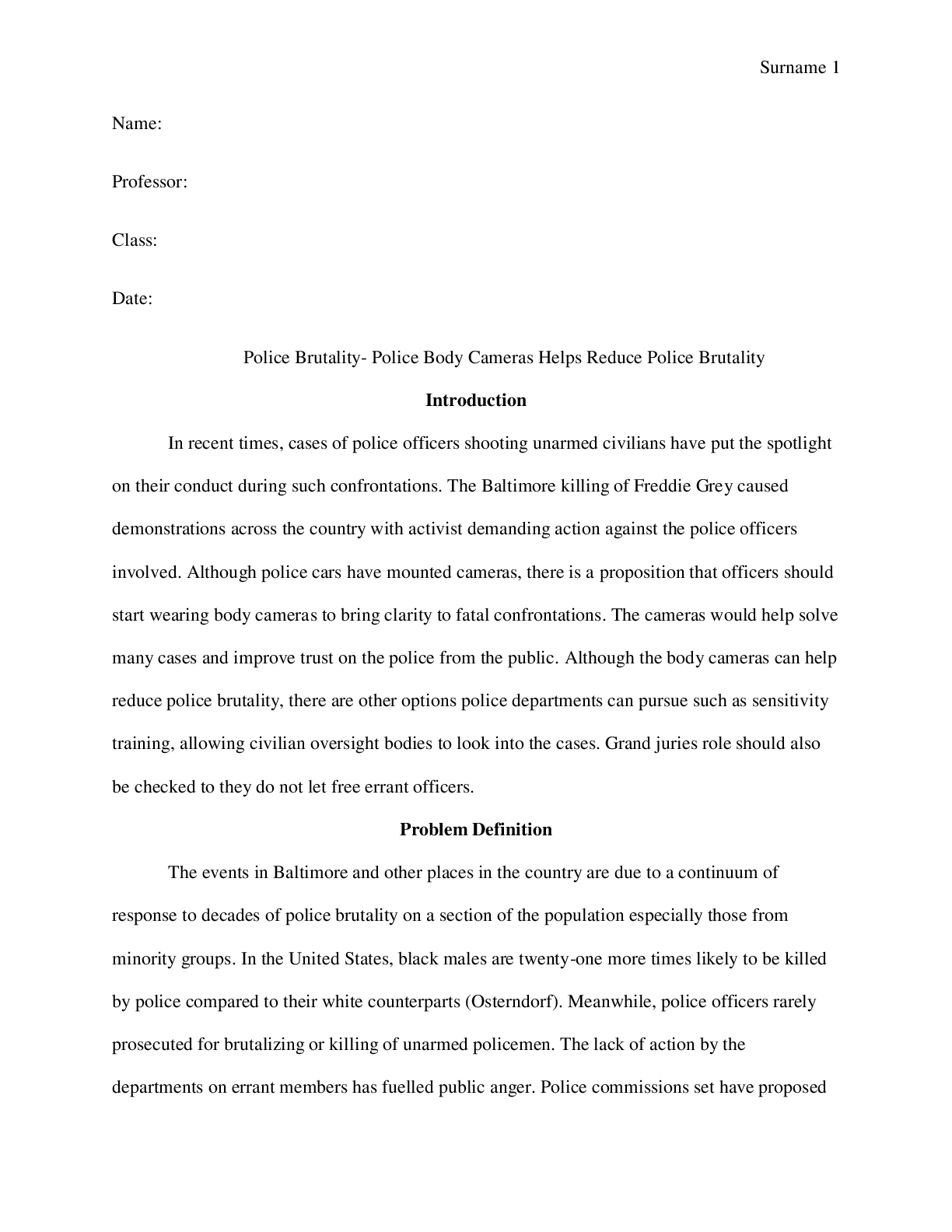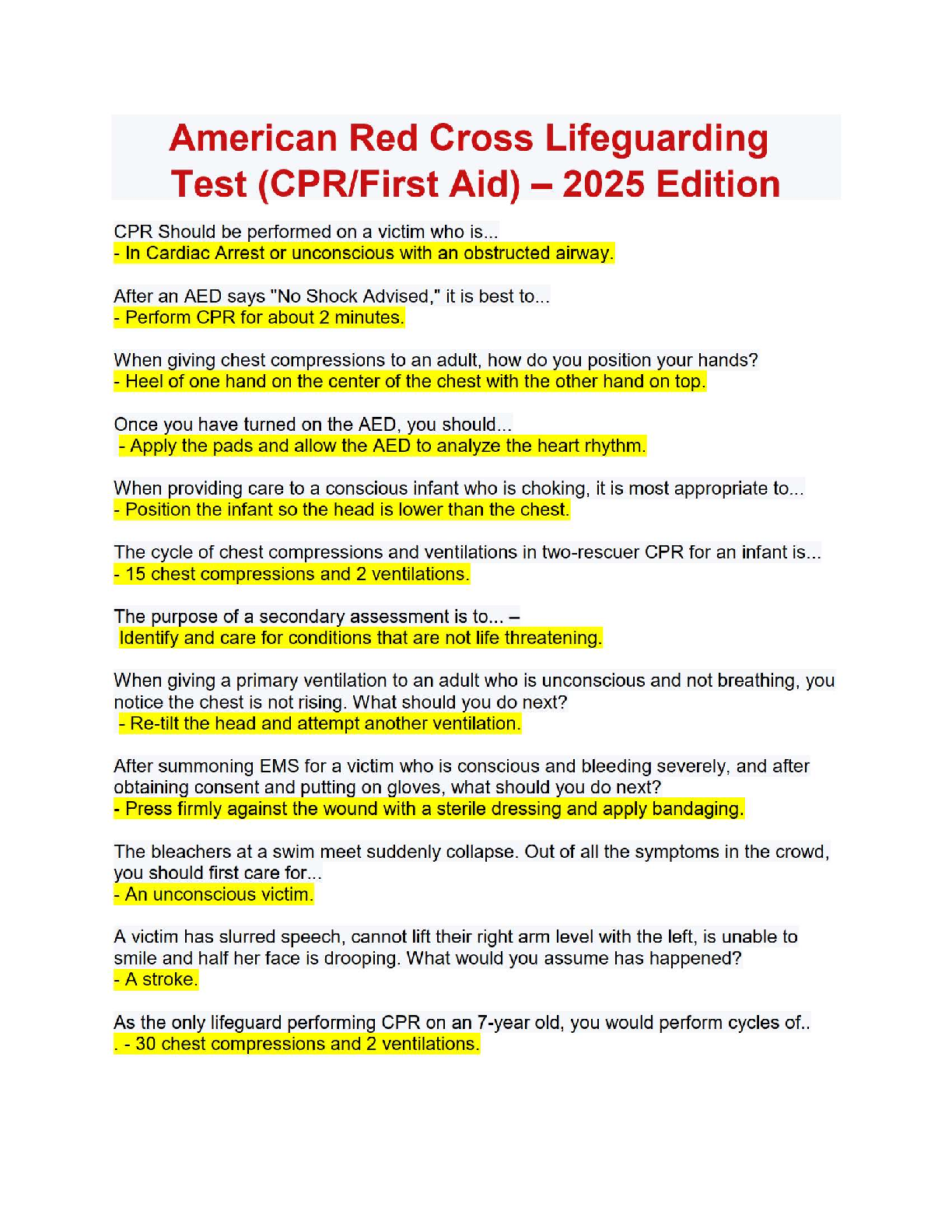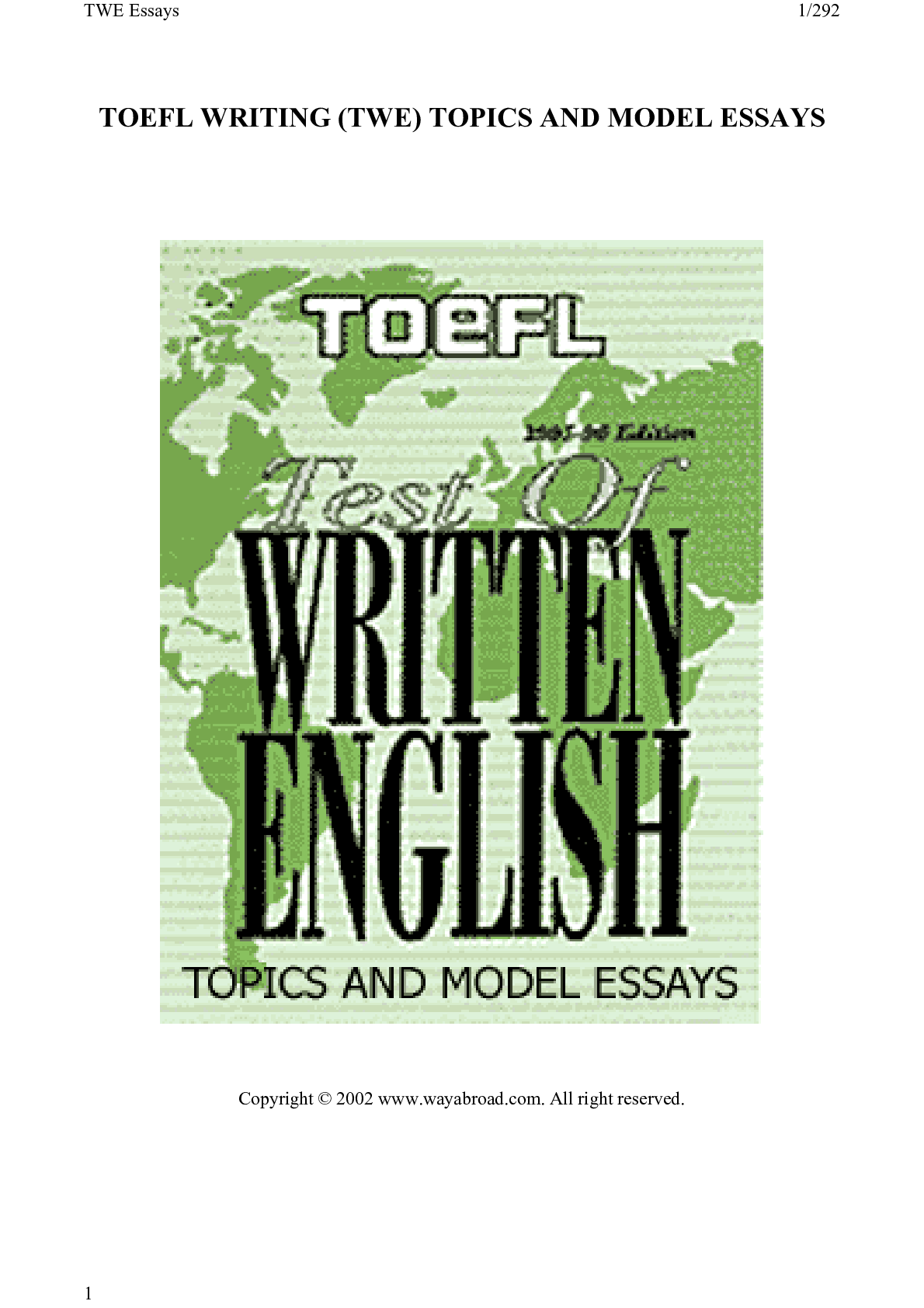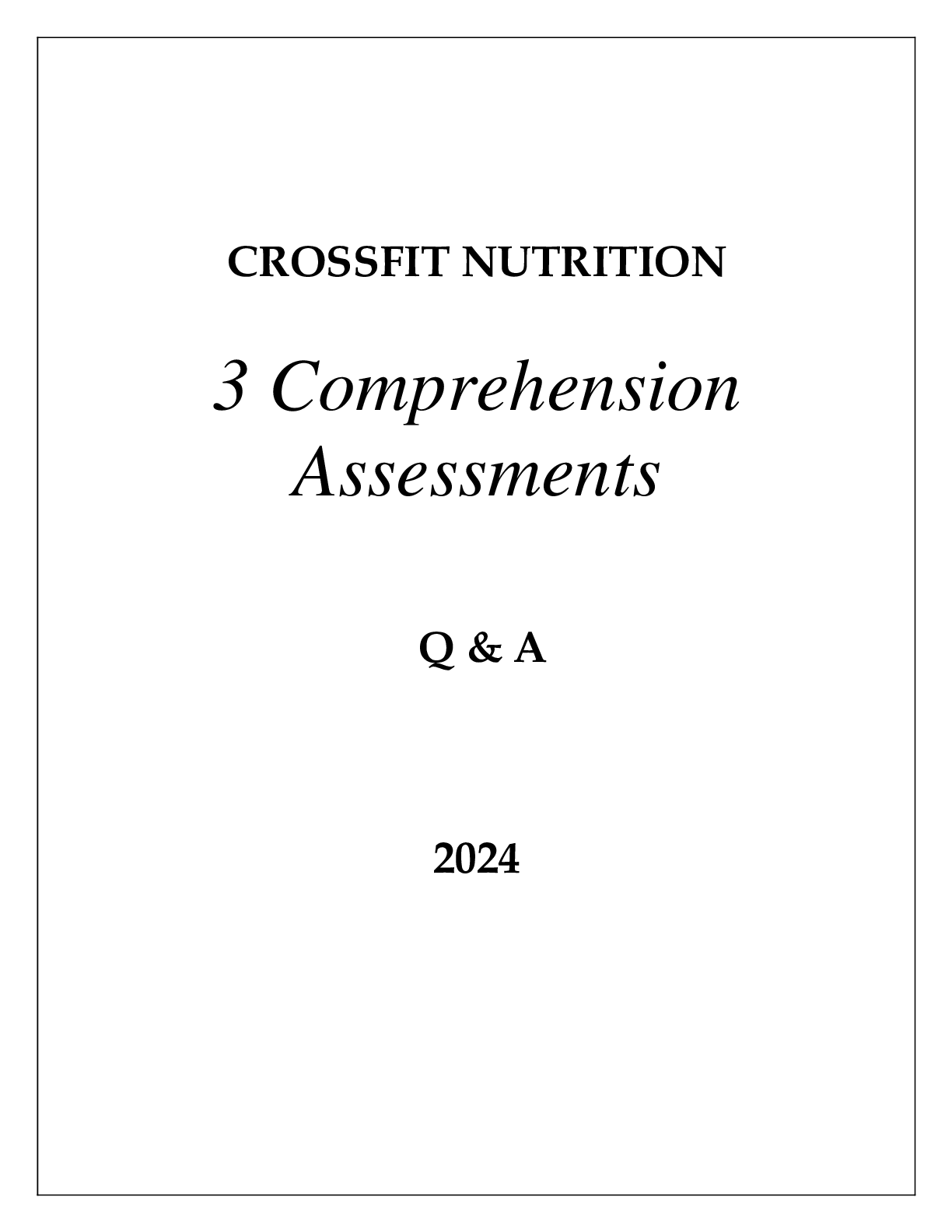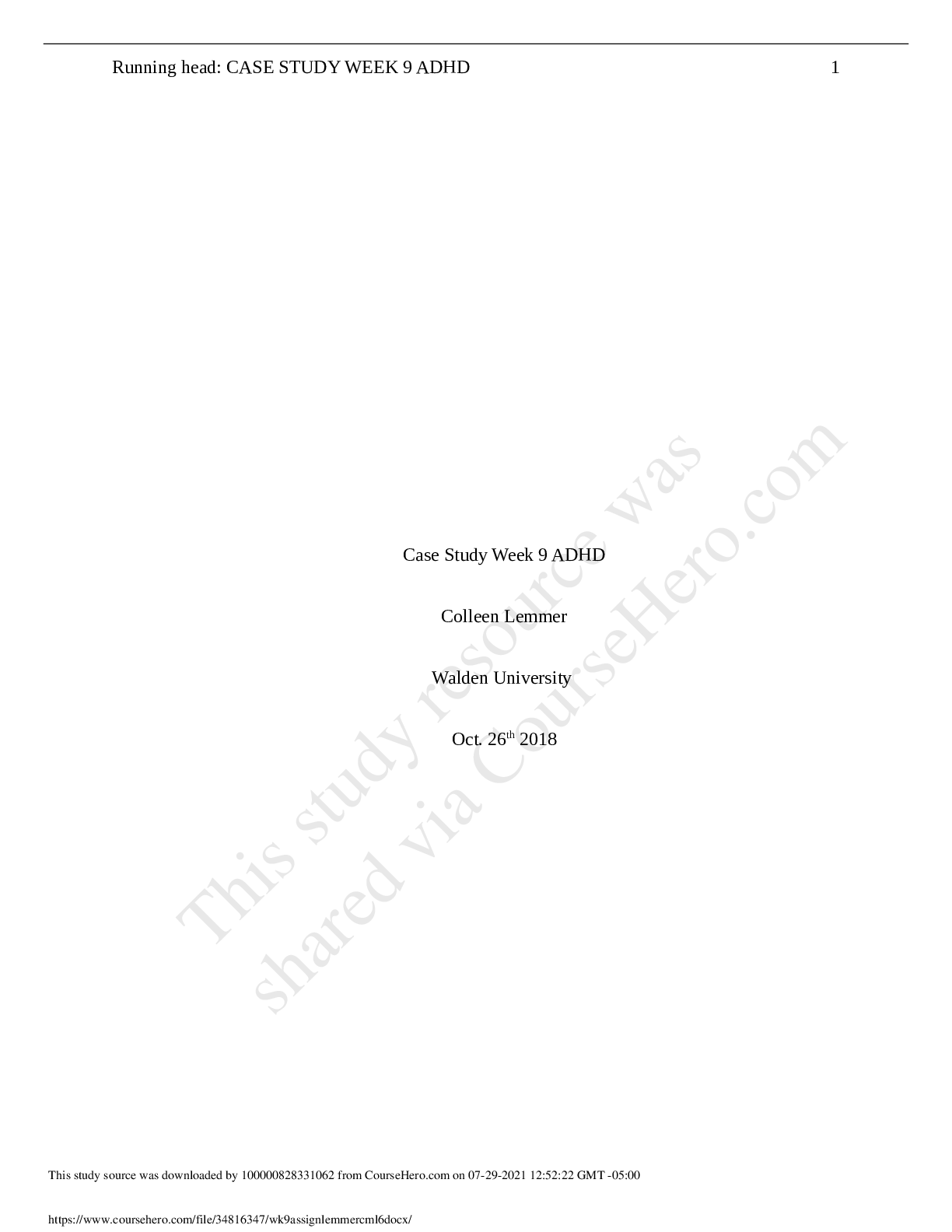*NURSING > ESSAY > NR 535 Week 2 Assignment: Personal Philosophy of Teaching and Learning (GRADED A) (All)
NR 535 Week 2 Assignment: Personal Philosophy of Teaching and Learning (GRADED A)
Document Content and Description Below
NR 535 Week 2 Assignment: Personal Philosophy of Teaching and Learning (2 Versions) NR 535 Week 2 Assignment: Personal Philosophy of Teaching and Learning Slide 1: Hello, my name is Annie Wes ... t and this is my Week 2 assignment for course nr535 that includes a PowerPoint of my personal philosophy of teaching and learning. Slide 2: As an MSN prepared nurse, I intend to utilize my skills as a nurse educator in an academic setting such as a ADN program. Responsibilities of a nurse educator in an academic setting include: -designing a curriculum that meets the needs of healthcare, the students, and the community -assessing learning needs and tendencies of students and tailoring the education to meet those needs -helping students to identify their learning needs, strengths, and limitations, and identifying learning opportunities that will build upon strengths and help to overcome limitations -implementing teaching strategies that aid in the learning process and acquisition of knowledge -evaluating learning (Oermann, 2022). Slide 3: Overview of Philosophy What is a philosophy of nursing? Summary of values, ethics, beliefs, and motivations for being a nurse. It focuses on perspectives regarding nursing practice and patient care. A nursing philosophy identifies the beliefs and theories that shape nursing practice (Cheraghi et al., 2019). My nursing philosophy: In my teaching, I intend to utilize a humanistic or person-centered approach to promote learning. I believe that everyone learns differently. This is attributed to different life experiences, learning habits, preferences, and interests. Education should be focused on identifying the learner’s individual needs, current knowledge, and learning goals. I also believe that people learn best when they are allowed to participate in the planning of their education and the content is of relevance to them. Lastly, I believe in the benefit of a hands-on approach to teaching and learning that allows the learner to walk through the steps of the content and allows them to process the information and relate the content to their current knowledge while utilizing critical thinking to solve problems. -Core beliefs regarding the purpose of nursing education: I believe that the purpose of nursing education is to prepare graduate nurses who can meet diverse patient needs, utilize nursing and critical thinking skills to deliver safe, high-quality care, and work effectively with healthcare professionals in a complex, ever-changing environment. So, how does this happen??? Effective education. Core beliefs regarding the role of the nurse educator? Nurse educators play a vital role in mentoring students and ensuring that they receive a high- quality education (Mthiyane & Habedi, 2018). I believe the role of a nurse educator to be to improve nursing education and facilitate learning and growth. Nurse educators should have an adequate understanding of learning theories because they are a necessary component of evidence-based educational practice. Understanding learning theories aids in the selection of the most appropriate teaching strategies, learning objectives, and approaches to assessment and evaluation based on the diverse needs of the student population. It also helps improve learning and knowledge when the educator can integrate the concepts from various learning theories into their educational practice (Mukhalalati & Taylor, 2019). Also, to support the development of student nurses by utilizing teaching methods and concepts that are consistent with current evidence-based practice. Core beliefs regarding learner characteristics: I believe the learner must take responsibility for their growth by remaining motivated to learn and receptive to feedback from educators. They must also take ownership of their actions by exhibiting academic integrity and honesty. Core beliefs regarding the variables that influence the teaching and learning process: How is learning measured? Learning takes place when knowledge is acquired and applied to practice (Pivac et al., 2021). A major influencer of the success of a teaching-learning relationship is a positive relationship between the educator and the student. Communication is essential in the creation of an effective educational relationship. It allows for needs to be addressed and expectations to be identified. Another factor is the educator’s ability to assess the learning needs and tendencies of the student. With successful identification and utilization of teaching strategies to effectively meet those needs, an environment conducive to learning is then created. Application of Educational Theory: With an MSN degree as a nurse educator, I intend to teach in an associate degree nursing (ADN) program. From my experience, many people taking courses at an ADN facility are adult learners who are either continuing their education in the same career field or are returning to school seeking a second career or a career change. An educational theory that I feel supports my nursing philosophy and beliefs about teaching and learning is Knowles’ Theory of Andragogy. This theory focuses specifically on adult learning and follows four principals: 1-adults need to be involved in the planning and evaluation of their education. 2-expereince provides the basis for learning activities. 3-adults are more interested in learning subjects that have immediate relevance to their job and/or personal life. 4-learning is problem-centered rather than content- oriented. This learning theory is consistent with my philosophy as my philosophy highlights the importance of the learner being responsible for and active in their learning. Like Knowles, I acknowledge that everyone learns differently based upon their experiences, learning habits, preferences, and interests and that people are more inclined to want to learn and pay attention when the content being taught holds relevance to the learner whether it be on a personal or professional level. Lastly, Knowles’ theory and my philosophy both recognize that adults tend to use a problem-solving approach to learning, therefore, allowing learners to use their critical thinking skills to process information and come up with a solution is beneficial. SELECTED TEACHING METHODS Education for adult learners should focus more on the process of learning. Strategies consistent with this educational theory are case studies, role playing, simulations, and self-evaluations. Educators who follow this theory act as a facilitator to learning rather than a lecturer. (Belvins 2021) The three teaching methods I selected for this assignment are the use of unfolding case studies, simulations, and self-evaluations. CASE STUDY My philosophy and Knowles’ theory both recognize that adult learners learn best when they are allowed to utilize a problem-centered approach to learning. The use of case studies promotes the use of critical thinking and problem-solving skills which are methods consistent with adult learning tendencies. Case studies require the accurate processing and assessment of information, attention to detail, and critical thinking skills to be able to successfully complete the activity. The use of case studies allows the learner to practice their critical thinking, assessment, and problem-solving skills. This teaching method will be useful in fostering learning in an ADN program. SIMULATION My philosophy highlights the belief that everyone learns differently and has varying levels of knowledge. A factor that influences the way students learn and act is based upon previous experiences (and mistakes). And the knowledge they have is a result of these experiences. Additionally, Knowles’ theory addresses the concept that adults learn best when it is through experiences. Simulations offer exposure to various situations and results in continued experience and knowledge for learners. Simulations occur in an educational setting that places the students in a real-life scenario and allows them to utilize their critical thinking, assessment, and nursing skills to treat a patient. The idea behind these simulations is repeated exposure to various situations to allows the student to learn, grow, make mistakes, and gain knowledge in a comfortable environment, so that when they do begin their professional nursing practice, they are confident in their skills, self, and abilities, and are able to work their way through any situation. SELF-EVALS My philosophy focuses on identifying the student’s individual needs, habits, and goals in regard to their learning and education. This practice will allow me to gain a better understanding of how to be successful in teaching the student and ensuring that they get the best education. Self-evaluations will allow both myself and the student to identify the students needs, goals, and habits and create a plan to best educate them. Knowles’ theory identifies the importance of the adult learner being involved in the planning and evaluation of their education. Self- evaluations allow the learner to be active in the planning and creation of their education and reflect upon their growth as they progress through the educational program. Self-evaluations are beneficial for both the learner and the educator. Self-evaluations allow the learner to reflect upon their personal goals and needs and identify areas they feel like they are strong in and those that they need to improve upon. An educator can then use this information to identify teaching strategies to best meet the needs to the learner and integrate activities that will help them to improve upon needed areas. SUMMARY: Within this presentation I identified the setting for my future practice and my teaching philosophy which included my beliefs regarding the purpose of nursing education, the role of a nurse educator, the role of a learner, and variables that influence teaching and learning. My intended area of practice is in an ADN program working with adult learners. Within this setting I plan to use principals derived from Knowles’ educational theory to be successful as a nurse educator. As an educator, it is my goal to improve nursing education and facilitate learning. I will enable students to build upon their previous knowledge, develop and improve upon skills, utilize critical thinking skills, and take an active role in their education. I will provide positive feedback and offer ideas for improvement. These practices will be done for the common goal of making a positive impact on nursing practice and the provision of holistic, safe, high-quality nursing care. I believe the next step that will contribute to my success as a graduate student in the nurse educator track is the creation of a curriculum that is appropriate for an ADN program. To do this, I will continue to research educational theories, learning strategies, and practices. and challenge myself to observe professional nurse educators and identify strategies they use to be successful as educators. • Identification of one next step in order to be successful as graduate student in the education track References Belvins, S. (2021). Learning styles: The impact on education. Medsurg Nursing, 30(4), 285-286. https://www-proquest-com.chamberlainuniversity.idm.oclc.org/docview/2560119642? OpenUrlRefId=info:xri/sid:primo&accountid=147674 Cheraghi, F, Yousefzadeh, M., & Goodarzi, A. (2019). The role and status of philosophy in nursing knowledge, insight, and competence. Journal of Clinical Research in Paramedical Sciences, e90762, 1-5. https://doi.org/10.5812/jcrps.90762 Mthiyane, G. N., & Habedi, D. S. (2018). The experiences of nurse educators in implementing evidence-based practice in teaching and learning. Health SA, 23, 1177. https://doi.org/10.4102/hsag.v23i0.1177 Mukhalalati, B. A., & Taylor, A. (2019). Adult Learning Theories in Context: A Quick Guide for Healthcare Professional Educators. Journal of medical education and curricular development, 6, 2382120519840332. https://doi.org/10.1177/2382120519840332 Oermann, M. (2022). Teaching in nursing and role of the educator: The complete guide to best practice in teaching, evaluation, and curriculum development (3rd ed.). Springer Publishing Company. Pivač, S., Skela-Savič, B., Jović, D., Avdic, M., & Smajlovic, S. K. (2021). Implementation of active learning methods by nurse educators in undergraduate nursing students’ programs – a group interview. Bio Med Central Nursing, 20, 173. https://doi.org/10.1186/s12912-021-00688-y [Show More]
Last updated: 3 years ago
Preview 1 out of 5 pages
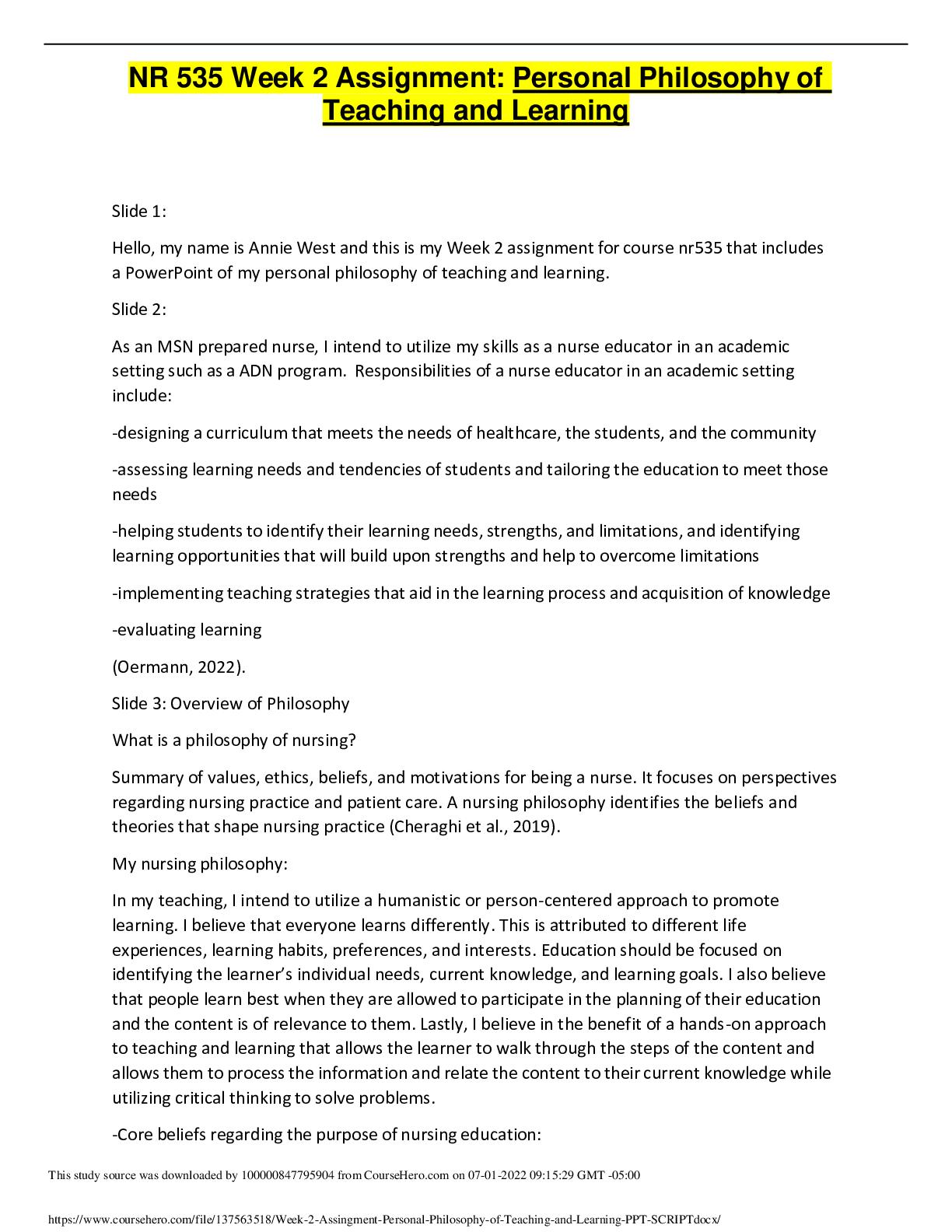
Buy this document to get the full access instantly
Instant Download Access after purchase
Buy NowInstant download
We Accept:

Also available in bundle (1)
Click Below to Access Bundle(s)

NR 535 Theoretical Foundations & Instructional Strategies For The Nurse Educator (NR 535 Entire Course Week 1 – 8) BUNDLE | 100% CORRECT
NR 535 Week 1 Discussion: Collaboration Café NR-535 Week 1 Discussion: Nursing Education Goals NR 535 Week 1 Learning Styles Quiz Worksheet NR-535 Week 1 Student’s Template: Self-Reflection N...
By Prof. Goodluck 3 years ago
$14.5
17
Reviews( 0 )
$11.00
Can't find what you want? Try our AI powered Search
Document information
Connected school, study & course
About the document
Uploaded On
Jul 01, 2022
Number of pages
5
Written in
All
Additional information
This document has been written for:
Uploaded
Jul 01, 2022
Downloads
1
Views
204

